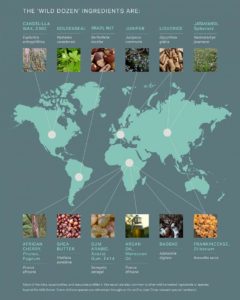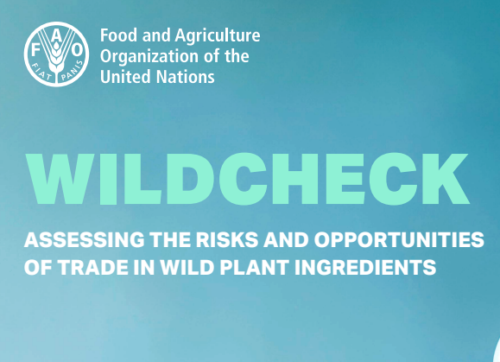A Joint Webinar with the American Botanical Council’s Sustainable Herbs Program and TRAFFIC
 To register for future SHP webinars go here.
To register for future SHP webinars go here.
On 22 April, TRAFFIC, FAO, and the IUCN Species Survival Commission Medicinal Plant Specialist Group released their report, WildCheck: Assessing risks and opportunities of trade in wild plant ingredients. We co-hosted a webinar with TRAFFIC to launch the WildCheck Report
This session introduced the report through a discussion with stakeholders who interact with wild plant ingredients in different ways. They explored key questions:
- What is the demand for these ingredients and how has it changed in recent years?
- Why is urgent action needed towards responsible sourcing, and who is responsible?
- What are the key risks to look out for, and the opportunities for businesses to seize?
- How do these questions apply to the frankincense trade?
Webinar Recording
You can watch the complete recording here and below are some key highlights from the discussion.
Key Takeaways
- Primary threat to all wild-harvested plants and other species is loss/degradation of habitat.
- Harvest pressure, and need for sustainable harvest protocols, are also important.
- Loss of traditional and local harvester knowledge and control over resource access is also significant which increases the responsibility of companies sourcing the plants to step in to implement sustainable harvest protocols.
- The fundamental challenge is protecting the integrity and quality of habitat – against land conversion, as well as larger threats such as climate change.
- Many stakeholders have a role to play – consumers, decision-makers, investors, practitioners. The report aims to make information on a flagship set of wild ingredients – the Wild Dozen – accessible and understandable for this range of important stakeholders.
- Helping to overcome this critical first step of ‘I don’t know where to start’ – what are some important wild ingredients, what are the risks that need to be addressed in their supply chains, and what are the opportunities waiting to be seized?
Watch the entire conversation (above) to learn more about the methods used to assess social and biological risk, hear examples of how particular species can be a tool for broader conservation, and learn details from the specific example of frankincense.
Next Steps
- Download the WildCheck report.
- Consumers/individuals search for wild ingredients in your household products and share them on social media using #IFoundWild.
- Businesses, policymakers, practitioners: Sign the #WeUseWild Pledge to demonstrate your commitment to responsible sourcing of wild ingredients. To sign up, or for more details, contact [email protected].
- Contact [email protected] to collaborate on wild plant ingredients with TRAFFIC
- Look out for the WildCheck Platform, launching in the next few months.
Speakers
- Caitlin Schindler Before joining TRAFFIC in 2021, Caitlin earned her Master’s in Biodiversity, Conservation and Management, then worked for 5 years on sustainability and workers’ rights in a variety of commercial supply chains, including seafood, timber, food and farming. She now applies this experience to wild plant ingredients within TRAFFIC’s Wild at Home project, which aims to raise industry and consumer awareness of, and engagement with, wild plant ingredients. The WildCheck report is the principal output of this project, which was released on 22 April 2022 (Earth Day).
- Danna J. Leaman, PhD, a conservation biologist/ethno-botanist, is an independent consultant affiliated with the Canadian Museum of Nature as a Research Associate. Danna’s research focus is conservation and sustainable use of economically important plants, working with numerous national and international organizations. She is Co-Chair of the Medicinal Plant Specialist Group of the Species Survival Commission, International Union for Conservation of Nature (IUCN), a founding member of the Board of Trustees of the FairWild Foundation, and a member of the SHP Advisory Group.
- Anjanette DeCarlo received her doctorate in Natural Resources and Environment from the University of Vermont. She is a Lecturer on supply chains in the Sustainable Innovation MBA at UVM and Anthropology at Saint Michaels College. As the Chief Sustainability Scientist at the Aromatic Plant Research Center, she conducts primary anthropological and ecological field research and ecological supply chain analysis on aromatic and medicinal species. As founder of the Save Frankincense initiative (and sole proprietor of her own LLC) she consults with the private sector on green and ethical supply webs and provides education and outreach for the public.
- Hilary Sommerlatte is the founder of Arbor Oils of Africa, has spent many years exploring the uses of wild African plant ingredients for skin care use and perfumery. After her work looking into the potential of the indigenous African olive, Olea europaea subsp. cuspidata and the Cape Chestnut trees Calodendrum capense for edible and cosmetic uses, Hilary explored local Kenyan frankincense and myrrh species, from the northern semi desert pastoralist areas. Two previously little known frankincense species, Boswellia neglecta and Commiphora confusa were identified. She has set up organically certified resin collection groups for the sustainable harvest of these species. She distills the resins and supplies several cosmetic companies in Europe with the essential oils.


Comments